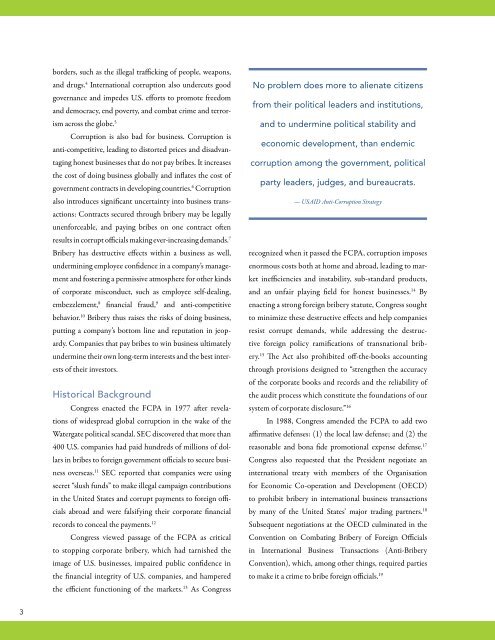fcpa-resource-guide
fcpa-resource-guide
fcpa-resource-guide
You also want an ePaper? Increase the reach of your titles
YUMPU automatically turns print PDFs into web optimized ePapers that Google loves.
3<br />
borders, such as the illegal trafficking of people, weapons,<br />
and drugs. 4 International corruption also undercuts good<br />
governance and impedes U.S. efforts to promote freedom<br />
and democracy, end poverty, and combat crime and terrorism<br />
across the globe. 5<br />
Corruption is also bad for business. Corruption is<br />
anti-competitive, leading to distorted prices and disadvantaging<br />
honest businesses that do not pay bribes. It increases<br />
the cost of doing business globally and inflates the cost of<br />
government contracts in developing countries. 6 Corruption<br />
also introduces significant uncertainty into business transactions:<br />
Contracts secured through bribery may be legally<br />
unenforceable, and paying bribes on one contract often<br />
results in corrupt officials making ever-increasing demands. 7<br />
Bribery has destructive effects within a business as well,<br />
undermining employee confidence in a company’s management<br />
and fostering a permissive atmosphere for other kinds<br />
of corporate misconduct, such as employee self-dealing,<br />
embezzlement, 8 financial fraud, 9 and anti-competitive<br />
behavior. 10 Bribery thus raises the risks of doing business,<br />
putting a company’s bottom line and reputation in jeopardy.<br />
Companies that pay bribes to win business ultimately<br />
undermine their own long-term interests and the best interests<br />
of their investors.<br />
Historical Background<br />
Congress enacted the FCPA in 1977 after revelations<br />
of widespread global corruption in the wake of the<br />
Watergate political scandal. SEC discovered that more than<br />
400 U.S. companies had paid hundreds of millions of dollars<br />
in bribes to foreign government officials to secure business<br />
overseas. 11 SEC reported that companies were using<br />
secret “slush funds” to make illegal campaign contributions<br />
in the United States and corrupt payments to foreign officials<br />
abroad and were falsifying their corporate financial<br />
records to conceal the payments. 12<br />
Congress viewed passage of the FCPA as critical<br />
to stopping corporate bribery, which had tarnished the<br />
image of U.S. businesses, impaired public confidence in<br />
the financial integrity of U.S. companies, and hampered<br />
the efficient functioning of the markets. 13 As Congress<br />
No problem does more to alienate citizens<br />
from their political leaders and institutions,<br />
and to undermine political stability and<br />
economic development, than endemic<br />
corruption among the government, political<br />
party leaders, judges, and bureaucrats<br />
— USAID Anti-Corruption Strategy<br />
recognized when it passed the FCPA, corruption imposes<br />
enormous costs both at home and abroad, leading to market<br />
inefficiencies and instability, sub-standard products,<br />
and an unfair playing field for honest businesses. 14 By<br />
enacting a strong foreign bribery statute, Congress sought<br />
to minimize these destructive effects and help companies<br />
resist corrupt demands, while addressing the destructive<br />
foreign policy ramifications of transnational bribery.<br />
15 The Act also prohibited off-the-books accounting<br />
through provisions designed to “strengthen the accuracy<br />
of the corporate books and records and the reliability of<br />
the audit process which constitute the foundations of our<br />
system of corporate disclosure.” 16<br />
In 1988, Congress amended the FCPA to add two<br />
affirmative defenses: (1) the local law defense; and (2) the<br />
reasonable and bona fide promotional expense defense. 17<br />
Congress also requested that the President negotiate an<br />
international treaty with members of the Organisation<br />
for Economic Co-operation and Development (OECD)<br />
to prohibit bribery in international business transactions<br />
by many of the United States’ major trading partners. 18<br />
Subsequent negotiations at the OECD culminated in the<br />
Convention on Combating Bribery of Foreign Officials<br />
in International Business Transactions (Anti-Bribery<br />
Convention), which, among other things, required parties<br />
to make it a crime to bribe foreign officials. 19


